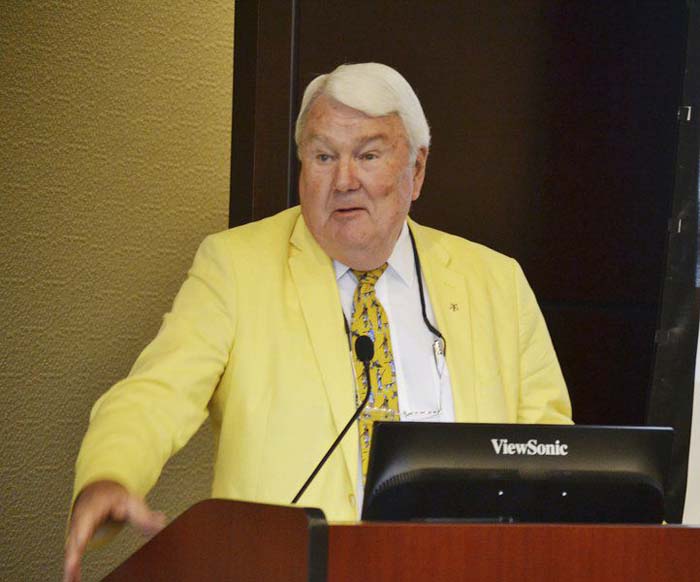Georgia adapting to lawsuit that closed Southwestern State
Published 4:12 pm Friday, July 21, 2017

- Pat Donahue/Times-EnterpriseThomas County Sheriff Carlton Powell outlines the expense involved in taking patients in crisis to state facilities.
THOMASVILLE — The settlement of a federal lawsuit on how individuals with behavioral disabilities and other ailments are treated has led Georgia to transform how it handles those situations.
The lawsuit’s resolution led to Southwestern State Hospital in Thomasville closing in 2013, as part of putting those former clients into community settings.
Trending
“It has put us as a state into a pretty tight spot in trying to figure out how to move these individuals into communities,” said state Rep. Terry England (R-Auburn), co-chairman of the House Rural Development Council. “It’s been extremely difficult for the state. It’s been extremely difficult for the individuals themselves.”
Department of Behavioral Health and Developmental Disabilities Commissioner Judy Fitzgerald said difficult decisions had to be made about moving services into the community. The lawsuit’s settlement called for individuals with intellectual and development disabilities to be moved into the most integrative setting in which they could be served.
“The belief is that all those individuals, with the right support, can thrive in the community,” she said. “We’re trying to get folks to the right level of care at the right place at the right time.”
In 2009, Southwestern State housed a daily average of 56 people in adult mental health and 126 in intellectual and developmental disabilities. The agreement with the Department of Justice does not extend to those with mental illness, Fitzgerald pointed out.
“There will always be a need for hospital beds for individuals with mental health needs,” she said. “Those beds will be for those with chronic needs who cannot be served in the community.”
Currently, there are 209 people with intellectual and developmental disabilities in state hospitals. The agreement calls for the state to continue moving people into the community at a reasonable rate, “but we will not move faster than a community and the services are prepared for,” Fitzgerald said. “Above all, the safety and well being of the people we serve is the most important thing.”
Trending
Fitzgerald lauded state government, from the governor’s office to the General Assembly, for partnering with the agency in addressing issues at a community level.
“You cannot close hospitals and just say, ‘figure it out,’” she said. “They agreed to fund some of the services and fund evidence-based services.”
Other states are looking to Georgia on how to move those patients into a community setting and how to continue to care for them, Fitzgerald said.
“Georgia is becoming a model for individuals living with disabilities living in the community,” she said. “They can have independence. They can participate in a meaningful and fulfilling life. They can make friends. In many cases, it gives them a better opportunity to reconnect with families.
The group home settings many of them have been moved into are capped at four people each. The state also paused transition after communities did not have local doctors and local hospitals ready to serve them appropriately.
“I feel confident in our team’s ability to prepare an individual, a provider and a local community to serve highly complex and fragile individuals in the community,” Fitzgerald said.
The state has established behavior crisis centers, which are short-term, walk-in facilities that operate around the clock. Those centers have emergency receiving capability and crisis stabilization beds. The Thomasville and Valdosta centers each have 24 beds and six temporary observation beds, while the Albany facility has 30 beds and six temporary observation beds.
“When you close a hospital’s doors, you still need 24/7 care,” Fitzgerald said. “That’s what these behavioral crisis centers are. They are short term facilities. When it’s assessed an individual has a need, they can go to a crisis stabilization bed. This is not intended to be a long-term service. We want to serve patients as close to home as possible.”
When Southwestern State closed, there were 67 beds for mental health. Now, there are 96 crisis beds and three centers and there is access to beds at private hospitals under contract with the department, Fitzgerald said.
“These behavioral crisis centers are more robust than what we had before,” she said. “The dollars you put into building these BCCs really does open access. Many states would like to have facilities like this.”
There also are mobile crisis teams available in all 159 counties, and the average response time in the state has to be one hour or less. “There aren’t many who have mobile crisis teams in their states,” Fitzgerald said.
The commissioner also said outpatient services are important. “The jail is not the place for those individuals to be. We’re all on the same side of this,” she said. “The more we can do to get them out of jail and get them to the treatment they need, that is the shared goal.”
Thomas County Sheriff Carlton Powell urged state lawmakers to open up more facilities in more isolated parts of the state.
“If I could fix it, I think the answer is we need more facilities closer,” he said. “It’s time for our Legislature and our leaders to put some facilities in our part of the state. This is a big, big problem we have.”
Taking those individuals who appear to be in crisis and need to be admitted to a state hospital has been a strain on law enforcement, Sheriff Powell acknowledged. In 2013, his deputies made 998 trips to facilities, going to Columbus, Macon or Savannah. Columbus and Macon each are 150 miles one-way, and the trip to Savannah is 190 miles one-way.
The sheriff said those trips cost the county as much as $480,000 in one year and his office has had 400 such trips so far this year.
“That’s a big cost in this state to these counties,” Sheriff Powell said. “When they call and say they’ve got to go, we only have a few minutes. They tasked the sheriffs of the state with getting these people to the facilities. They did not count the cost to individual counties. I’m probably in little better shape than some tasked with the responsibility.” Officials agreed that the goal isn’t to put people behind bars but to get them to help as quickly as possible.
“For someone in crisis, the last place they need to spend four to five hours is in the back of a sheriff’s car,” Rep. Jay Powell (R-Camilla) said.
Editor Pat Donahue can be reached at (229) 226-2400 ext. 1806.





